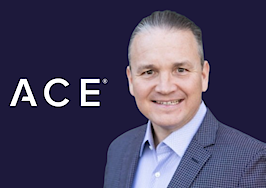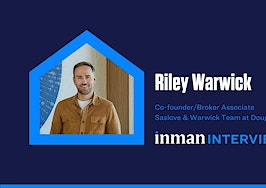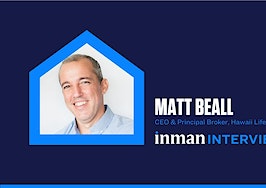 This June, Inman’s editorial theme is Teams — we’re going to go deep on what it takes to grow your team amid this intense seller’s market. And if you’re not already a subscriber to our Teams Beat email newsletter, sent every Thursday, sign up now.
This June, Inman’s editorial theme is Teams — we’re going to go deep on what it takes to grow your team amid this intense seller’s market. And if you’re not already a subscriber to our Teams Beat email newsletter, sent every Thursday, sign up now.
The pandemic changed everything for brokerage teams as we collectively worked to navigate and find new ways to thrive — despite numerous challenges. With no open houses and limited in-person contact, brokers had to harness the power of online tools and systems to keep business going.
As we continue to make progress and move toward a post-pandemic world, there are several needs that have emerged in our industry that will continue to be at the forefront for brokerage teams as they rethink their approach to buying and selling homes.
Vija Williams got a strong start to teams life when she started her own team at Keller Williams in 2014, building the team to 17 members and increasing revenue by 400 percent over the course of four years.
Now she lends her talents to Ben Kinney Companies at Keller Williams and Place Inc. (the brokerage-agnostic back-end platform Kinney developed about a year ago with Chris Suarez) as director of growth. She manages eight Ben Kinney brokerages and helps them tap into their full potential for growth.
Williams recently shared her thoughts on the future of teams with Inman and how teams can best position themselves for the changing face of real estate. The following is a condensed version of that conversation, which has been edited for clarity and brevity.
Inman: How do you think teams have evolved over the last couple of years? What does it mean to be part of a team today?
Vija Williams: I sound like a broken record — I think teams are the future of real estate and I think, more importantly, teams are the exciting future of real estate.
I think where they’re going is, I think they’re consolidating. So, I think that we’re getting fewer, bigger teams — the super teams.
Place is one of them. Place is really a platform, but still. But then you’ve got people like Kris Lindahl, Veronica Figueroa, Mark Spain, even Redfin, to a certain extent. In a sense, to me, Redfin is one giant team; they’re not run as a general brokerage. I really see Redfin as the biggest team in real estate, not a brokerage. They don’t allow in general agents.
I run eight brokerages, so for us, when you’re running brokerages, people come in and they have their own business, they’re individual agents right? They’re independent contractors, but at Redfin, you’re part of their team. You’re lead dependent — it’s completely the definition of a team.
But to me, the foundation of all of those is the team, not the brokerage. The brokerage is simply housing the team, if you will.
I think there’s a number of reasons [why teams are consolidating]. But, a big one is the consumer demands. I look back when I started real estate in 2002 and there wasn’t this sense that you could press a button and sort of have an expectation that you’re going to go see a house in an hour. There was a whole process back then.
But now the consumer is trained in a way that they can do that. The new studies I’m seeing are saying two-minute response time is likely necessary to try and capture somebody while they’re still on their phone or on the site to try to convert the lead and make the appointment.
You can’t do that as a single producer. So on top of everything I just said, [real estate agents are] expected to know how to run to a [profit and loss statement], and to have cash flow management, expense management, revenue projections, pipeline management — it’s just too much for one person.
So that’s why I think that we’re seeing [consolidation] more and more, and I think it’s going to continue to consolidate into the really big, efficient, well-run teams that are backing up what the real estate agent’s doing with the sales.
Yes, and like you said, we’ve been seeing a lot of consolidation already. And as teams consolidate with each other, do you think that can compromise the integrity of the team in any way as they continue to grow?
I think they actually improve; I think it’s the opposite. I think a team’s customer service and deliverables increase with size. Because there’s just more support, there’s more admin, the success [of the] team is bigger, everything’s better.
When you’re larger and you sell more units, it makes sense to have advertising contracts or lead contracts with Zillow or realtor.com and have really great CRMs. There’s an economy of scale that happens, and so it’s better, not worse.
Now turning to Ben Kinney and Place Inc., specifically, what have you all done to adapt as a team over the last year and a half as we’ve gone through this pandemic? How has that changed your team?
I think it’s made us better, and I think we’re not the only ones. It’s really forced us to up our games with virtual stuff — I know it sounds obvious, but it is true.
Of course it’s a tragedy what happened to people, but if you set that aside, it’s actually been really great for our business, as far as understanding what should be virtual and what should be physical.
You have to go see a house physically, you have to go walk through a listing physically, but you don’t need to do all the lead up and follow up physically. So that enables you to be super efficient and have a heavier client load and really service everybody quite well when you’re not running around in your car as much as you were before.
I’ve been [saying] to our people, the real story of this market isn’t the low inventory as much as it’s the insatiable buyer demand. With that said, what I am finding is, the top agents and the top teams are getting busier, and the marginal agents are struggling.
It’s a tough market if you don’t have skills to go get listings. And it’s a tough market if you can’t win against 15 offers. You have to be a pretty good agent. So teams are winning and top agents are winning right now.
In that sense, they’re getting a ton of business, they’re having to scale up faster, and definitely when you’re us and you’re a back-end platform to that, it’s a perfect partnership. Because we come in and do financial management, marketing, success team, we really come and do the whole back-end of the team, and the rainmaker and the agent just can go and get a ton of business, serve their clients, which is the most important thing, and deliver a phenomenal consumer experience, while we’re in the back-end helping run the business itself.
I am for sure seeing the busy getting busier and that’s who we serve — we serve that top 3 to 5 percent of agents in teams in every market — [that’s] our target market.
So, zooming out again then and thinking about the general future of teams — do you think there’s anything teams really need to keep top of mind to stay competitive and relevant as the industry continues to evolve in upcoming years?
That’s a great question and I think it’s an important question, too. I think that they really need to focus on the consumer experience — before, during and after the sale. I think that we’re seeing it, but more and more, we need to have as much in-house as possible.
We opened mortgage, title and escrow — so did a lot of people. And part of that’s just because we can control the experience, we can give them good rates, we can give them lower escrow or title, whatever it is, and we can manage the customer service experience when it’s something that we own.
I think that the consumer experience is everything, and I know our president, Chris Stuart, talks a lot about what he calls the “loyalty gap,” which is that seven to 10-year period of time in between sales. And I think that all of us need to do a better job continuing to stay front of mind with the buyer or the seller that we service so that they come back to us next time because most don’t, but most would. Most really enjoyed their agent, but at the time that they were ready to buy or sell again, they just weren’t there.
So I think you’re going to start seeing home services, security systems, insurance, things that can keep you in front of the consumer during that gap, that’s why Chris Stuart calls it the “loyalty gap” because they lose loyalty over that gap of time. We just have to do more and do better.
Was it a big transition for the company to adjust to providing those new services you’ve added on?
It’s a really big adjustment because we were a real estate company. Now we’re a consumer and a real estate brand — Place is everything now.
It continues to be a transition for us. It’s not like it happened and then just went away — as we form and reiterate and reinvent, it’s a continual process and I couldn’t be more excited about it. If it wasn’t that way, I’d be at the wrong company.
It is like real-time change right now. We are growing fast and adapting fast and doing what we need to do and it feels like whiplash sometimes. And if it doesn’t feel that way, then you probably aren’t doing it right.
Many teams have had a really successful year. What do you think teams should be investing in with their increased profits from this last year?
I think they should invest in their database. They should invest in their agents and their database, and the whole consumer and database experience. That could be the experience in the sale, during the sale, and then after the sale, and handling that for their agents.
Making one of their value props a tremendous database experience both from a marketing perspective and just what they’re experiencing from the team.
Any final thoughts?
Traditional brokerages are experiencing a huge shakeup and it’s not going away. Brokerages need to really figure out how they’re going to adapt to this moving forward. I think we are a very, very pro-team environment, both with our economic model, and our coaching and our experience and our support, but I see a lot of brokerages aren’t getting more teams because they’re not equipped to have large teams and I think that’s a mistake.













